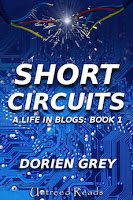My favorite painting at the Art Institute of Chicago is Ivan Albright’s That Which I Should Have Done I Did Not Do (subtitled The Door) I identify with it in some strange way, probably because I frequently find myself looking back on the closed doors of my life and saying: “If only I could go back and change things…do or say something I should have but didn’t; not do or say something I shouldn’t have but did; take an opportunity not taken; follow path A instead of path B.”
We all have closed doors in our past we wish we could reopen, to change what lies behind them. Yet we never think that if we could go back and change just one thing, from that point in time on, all bets are off. For you cannot change the past without changing everything that then follows. Tossing one small snowball of change onto the steep snow-covered slopes of time could trigger an avalanche which would inexorably sweep away everything that followed. And one problem resolved would open up an infinite number of new and different problems.
I used to wonder, after I moved from Los Angeles to the Great North Woods of northern Wisconsin and bemoaned my subsequent lack of…uh, let’s say “social contacts”… what would have happened had I stayed in L.A. Then I realized that had I done so, I could quite probably had a contact which would have resulted in my contracting AIDS, which is more a game of Russian roulette in large cities than in rural communities.
So many things I’ve said to people that I wish I either had not said or said differently. So many situations to which I wish I had reacted differently. But if I had, how might that have changed my then-future (but-now-present)? Escaping one unpleasant situation undoubtedly would have opened the door to countless other unpleasant situations I could not possibly foresee.
There are things, however, I would risk a subsequent unknown future to have changed. The most recent was when I did not have my cat Crickett put to death when she developed a cancerous tumor. Instead, seeing no evidence that she was in pain, I let her live far longer than I should have. And before Crickett there was my dog Duchess, whose death was solely due to my stupidity in not recognizing the clear signs of diabetes which killed her. How could I have done that? How could I not have seen she was seriously ill?
But the greatest regret of my life—the one single thing I wish with all my heart and soul I could change, would be to let my mother die several months before she did. I think I may have spoken of this before, but when she was diagnosed with lung cancer after being a smoker all her life, she and I agreed that if it reached the point where nothing more could be done, I would instruct the doctors to let her go. But I did not. “We’ll try this,” the doctors would say, and I’d let them. When it didn’t help, they’d say “We’ll try this,” and I’d let them. And mom, out of her love for me, said nothing to me, though she told a friend that she just wanted to die with dignity. She did not. She died a withered doll hooked up to tubes and machines which only prolonged her suffering, of which she never spoke, and all because I would not…could not…let her go. I still cry when I think of it, and will never forgive myself for that selfishness.
And ten years from now, we will all look back at regrets for things which will have happened between now and then, and there will be no way we can come back and change them, either.
So what is the answer? There is none. All we can do is, as we hopefully already have been doing, the very best we can. We cannot see the long-term results of our actions, but perhaps we can give them just a bit more thought before we take them, and hope for the best. I wish us luck.
----------
This blog is from Dorien's ebook of blogs, Short Circuits, available from UntreedReads.com and Amazon.com; it's also available as an audio book from Amazon/Audible.com. You can find information about Dorien's books at his web site: www.doriengrey.com:



















